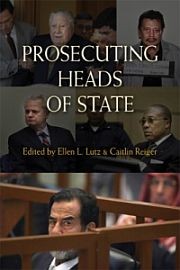Although head-of-state prosecutions like those of Hosni Mubarak in Egypt and Zine el-Abidine Ben Ali in Tunisia dominate today’s headlines, they are a relatively new phenomenon. As of today there are only about 70 of such trials in modern history, mainly since the early 1980s.
In this podcast, Caitlin Reiger, director of international policy relations at ICTJ, and coeditor of Prosecuting Heads of State, a book chronicling the phenomenon of accountability at the most senior level of government, discusses this notion in the context of ongoing trials of Mubarak and Ben Ali and the calls to bring to justice current and former heads of state accused of human rights abuses.
Reiger explains the importance of this type of high-level trial in transitional contexts, saying: “These trials demonstrate that everybody, right to the very top of the chain, has responsibility for what is committed on the ground. And that even if senior leaders may not have been directly involved or even directly aware, willful ignorance of systems that they’ve set up is not going to protect them.”
She also discusses the challenges facing head-of-state trials, explaining that they can often be seen as political processes and run the risk of being turned into show trials. She warns, “One of the important things to remember is that these processes, if they’re not done well, really do risk, in all the worst senses, degenerating into show trials. Because of the symbolic power of taking on and holding to account a very senior leader, including the president of the country, the danger for it to go wrong is a very high danger.”
She then outlines necessary elements of a successful trial, including an independent judiciary, transparency, and compliance with international fair trial and due process standards. Reiger comments, “Balancing those things, while ensuring full respect for rights of the defense, really goes toward needing to preserve public trust in the process. If there’s not public trust in the process—because it hasn’t been independent or fair—it means that whatever the outcome, it’ll continue to be challenged and disputed and ultimately the trial’s impact lessened.”
